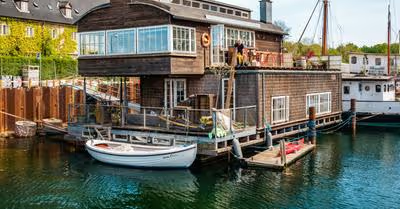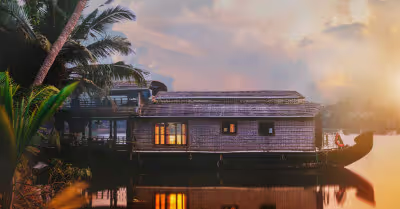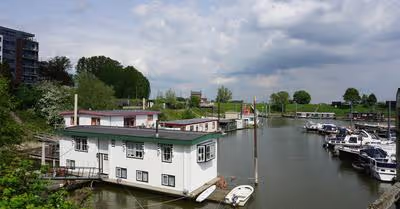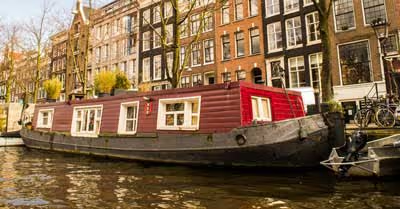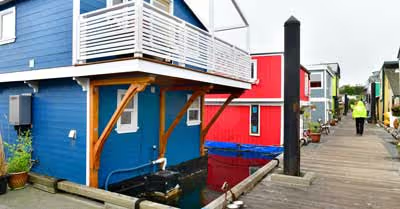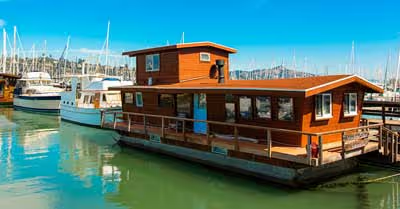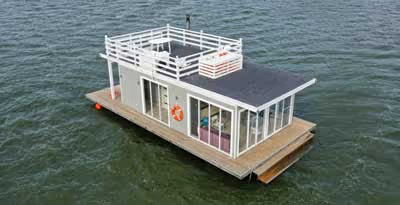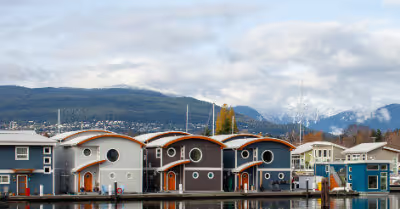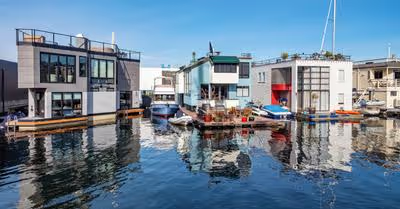
Key Takeaways
- Houseboats provide a unique and peaceful living experience, with mobility to explore.
- Houseboats are located on the water, have smaller living spaces, and lower costs.
- Living on a houseboat requires being prepared for water-related issues
Delve into the unique world of houseboats, and learn how they contrast with traditional homes, offering distinct living experiences.
Houseboats differ from land houses in mobility, legal status, and lifestyle. They are often mobile, offer a closer connection to nature, require specific maintenance, and have distinct legal classifications compared to traditional houses.
With years of living on and studying houseboats, I've gained unique insights into this fascinating lifestyle. There's nothing quite like the tranquillity of water living. You'll find the blend of adventure and coziness on a houseboat truly unparalleled. Imagine waking up to serene water views every day – it's a life-changing experience.
How are Houseboats Different From Other Houses?
When it comes to choosing a unique and enjoyable living space, houseboats often come to mind. These floating homes offer a lifestyle that combines the best of both land and water worlds.
Houseboats are quite distinct from other houses, offering a peaceful escape from the hustle and bustle of land dwellings. Being located on the water, houseboats provide stunning views, fishing opportunities, and a sense of adventure right at your doorstep. Additionally, these floating homes offer more mobility and flexibility in terms of choosing where to live, as they allow residents to explore different waterways or even travel along the coast.
Although houseboats can be a dream living space for some, it's important to be aware of the challenges that come with this lifestyle. For instance, houseboats can be more vulnerable to water-related issues and might require a higher level of maintenance compared to traditional homes.
Furthermore, living in a houseboat means you will typically have less space available, so you'll need to carefully consider your lifestyle requirements when deciding to move onto a floating home.
Houseboats Are On The Water
Float away into relaxation
A significant difference between a houseboat and a traditional house is the location. As the name suggests, houseboats are situated on water. This unique feature gives you picturesque water views, easy access to water activities, and a connection to nature.
Houseboats Don't Incur Property Taxes
Money saved is money earned
One financial advantage of houseboats over floating homes is that they generally don't incur property taxes, as they're not considered real estate. However, it's important to note that mooring or docking fees may still apply.
Houseboats Are Much Smaller
Minimalist living with maximum rewards
Houseboats are compact compared to traditional houses, which means adopting a minimalist lifestyle. The smaller living space might require some adjustments, but it's an excellent opportunity to declutter and enjoy simpler living.
Houseboats Have Breathtaking Sunrises and Sunsets
Spectacular views to cherish
With a houseboat, your morning coffee comes paired with breathtaking sunrises, and your evening wine with captivating sunsets. The unique location allows you to bask in nature's beauty like never before.
Houseboats Are Cheaper to Purchase
Affordability meets dream living
Generally, purchasing a houseboat is more affordable than buying a traditional home. That being said, it's important to factor in other expenses, such as dock fees, maintenance, and insurance, when considering total costs.
Houseboats Have Less Monthly Costs
More enjoyment, less pay
Houseboat living often incurs fewer monthly costs compared to land-based homes. For example, you might have lower utility bills due to the smaller living space. However, remember to factor in other costs, such as dock fees and maintenance.
Houseboats Have a Relaxing and Peaceful Environment
Your sanctuary on the water
Living on a houseboat offers a serene environment that's hard to compete with. You're surrounded by soothing water, friendly neighbors, and picturesque landscapes - a perfect recipe for relaxation.
Houseboats Are Less Safe in Storms
Navigating the risks
Safety can be a concern when living on a houseboat, as they're more vulnerable to storms and flooding than traditional homes. It's essential to monitor weather conditions, develop an emergency plan, and invest in insurance to mitigate these risks.
Houseboats Are Prone to Water Issues
Moisture, mold, and mildew, oh my!
Water damage, moisture, and mold can be potential issues for any houseboat owner. Regular maintenance and frequent checks for leaks or excessive moisture are crucial to maintaining a healthy and comfortable living environment.
Houseboats Are More Fun
Life's a party on a houseboat
Houseboat living offers increased daily fun, with quick access to water sports, swimming, and fishing. Embrace the outdoor lifestyle and forge unforgettable memories with your friends and family.
Tips for Staying Comfortably on a Houseboat
Living on a houseboat can be an exciting and unique experience. However, it requires a different approach when compared to living in traditional houses. To have a comfortable stay on a houseboat, you should consider factors such as navigation, living space, utilities, and safety. In this section, we will provide you with some practical tips to make your houseboat living experience enjoyable and comfortable.
Navigation
Familiarize yourself with the waterways and local regulations for safe navigation. Make sure your houseboat is well-equipped with the necessary tools such as GPS, maps, and communication devices. Proper planning and communication with marinas can help in securing a good spot for your boat.
Living Space: Sailboats often have limited living spaces, so it's essential to utilize the available area efficiently. Organize your belongings and invest in multi-purpose furniture to keep your living area clutter-free. Also, ensure that the bathrooms are functional and well-maintained.
Pros
- Lesser expenses on rent or mortgage
- Unique and adventurous lifestyle
- Mobile living
Cons
- Limited living space
- More maintenance needed
- Finding marinas can be challenging
Utilities
Access to utilities such as electricity and water can vary depending on the marina you choose. To ensure a comfortable living, invest in solar panels or generators for backup power and have a reliable water supply by connecting to the marina's facilities or using a portable freshwater system.
Here’s a table with houseboat utility alternatives:
Marina connection, portable freshwater system
- Safety: Safety should always be your top priority while living on a houseboat. Install smoke detectors, fire extinguishers, and carbon monoxide alarms. Keep life jackets and other safety equipment readily available. Make sure your boat follows local safety standards and undergoes regular inspections.
- Maintenance: Houseboats require more maintenance than traditional houses. Regularly inspect and clean your boat to prevent potential issues such as algae growth, rust, and leaks. Perform routine checks on the engine, electrical systems, and plumbing to enjoy comfortable and worry-free living.
- Deck Space: To make the most of your houseboat living, utilize the deck space efficiently. Create a comfortable outdoor relaxation area with seating and shade options. Additionally, you can incorporate plants and small gardens to enhance your houseboat's ambiance.
Living on a houseboat can be both challenging and rewarding. By considering these tips and carefully weighing the pros and cons, you can create a comfortable and enjoyable living space on the water. So embrace the adventure and enjoy the unique lifestyle that comes with living on a houseboat.
Frequently Asked Questions
Let's dive into some frequently asked questions to further enlighten your understanding of the intriguing world of houseboats.
What unique features set houseboats apart from traditional homes on land?
When comparing houseboats to traditional homes, several unique features stand out. Some of them include:
- Houseboats are situated on the water, offering spectacular views, fishing, and water-based activities right by your living space.
- Houseboats have increased mobility, allowing you to explore different waterways and relocate according to your needs.
- The compact design of houseboats promotes a minimalist lifestyle and encourages efficient use of space.
Can living on a houseboat provide cost savings compared to conventional houses?
Yes, there can be cost savings when living on a houseboat. Here's how:
- Houseboats are often cheaper to purchase than conventional homes, making them an affordable first-time home option.
- Houseboats generally have lower ongoing costs, such as reduced property taxes and maintenance expenses.
What are some downsides to consider before deciding to live on a houseboat?
Though houseboat living may seem idyllic, there are potential downsides to be aware of:
- Houseboats are more susceptible to weather-related issues and water damage.
- Confinement in small spaces might become challenging for some people.
- Security and privacy can be compromised compared to traditional homes.
- Access to amenities and services might be limited, depending on the location.
Could you list the key reasons someone might choose a houseboat as their home?
People choose to live on houseboats for a variety of reasons:
- They desire a sense of freedom, adventure, and connection to nature.
- They are often engaged in water-based activities, such as fishing or paddleboarding.
- Houseboats provide an affordable and alternative housing option.
- Some individuals prefer the minimalist and eco-conscious lifestyle the houseboat life offers.
How do the construction materials of houseboats differ from those used in land-based houses?
Houseboat construction materials differ from traditional housing materials to ensure durability in a marine environment. They often include:
- Marine-grade aluminum or steel for the hull.
- Stainless steel, composite materials, or treated wood for the superstructure.
- Weather-resistant finishes and paint to protect against corrosion and UV damage.
What aspects of houseboat living might appeal to someone looking for an alternative lifestyle?
Houseboat living can be an exciting alternative for those seeking a unique and unconventional lifestyle. Some aspects that might appeal include:
- Living in close connection with nature and the water.
- The ability to move and explore various locations effortlessly.
- Minimalism and the opportunity to downsize possessions.
- A tight-knit community of like-minded individuals who share in the houseboat experience.



